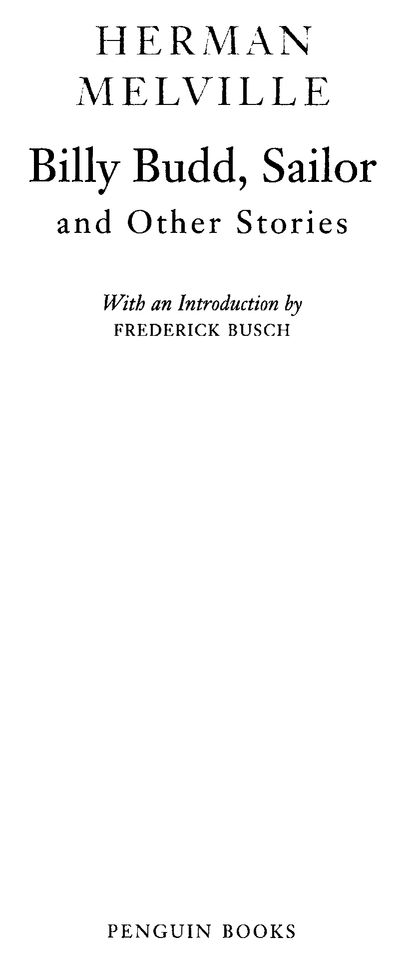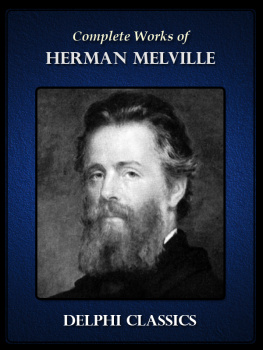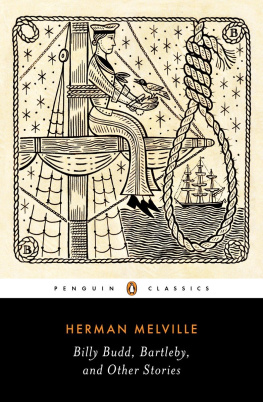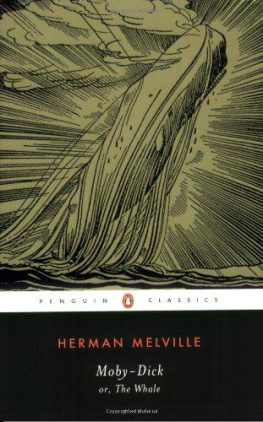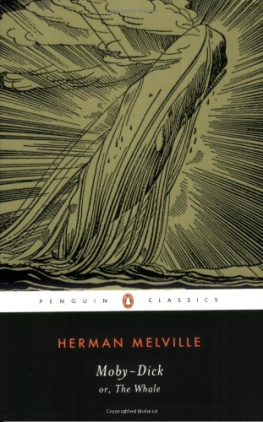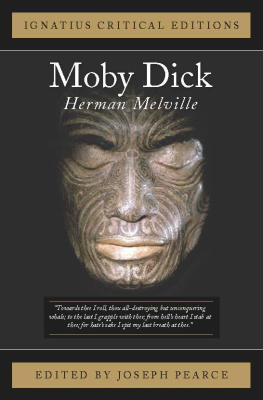Table of Contents
PENGUIN

CLASSICS
BILLY BUDD, SAILOR AND OTHER STORIES
HERMAN MELVILLE was born on August 1, 1819, in New York City, the son of a merchant. Only twelve when his father died bankrupt, young Herman tried work as a bank clerk, as a cabin-boy on a trip to Liverpool, and as an elementary schoolteacher, before shipping in January 1841 on the whaler Acushnet, bound for the Pacific. Deserting ship the following year in the Marquesas, he made his way to Tahiti and Honolulu, returning as ordinary seaman on the frigate United States to Boston, where he was discharged in October 1844. Books based on these adventures won him immediate success. By 1850 he was married, had acquired a farm near Pittsfield, Massachusetts (where he was the impetuous friend and neighbor of Nathaniel Hawthorne), and was hard at work on his masterpiece Moby-Dick. But literary success soon faded; his complexity increasingly alienated readers. After a visit to the Holy Land in January 1857, he turned from writing prose fiction to poetry. In 1863, during the Civil War, he moved back to New York City, where from 1866 to 1885 he was a deputy inspector in the Custom House, and where, on September 28, 1891, he died. A draft of a final prose work, Billy Budd, Sailor, was left unfinished and uncollated; packed tidily away by his widow, it was not rediscovered and published until 1924.
FREDERICK BUSCH is the author of many works of fiction, including the novels Rounds, Take This Man, The Mutual Friend, and Invisible Writing. He teaches literature and fiction writing at Colgate University.
Introduction
When he was thirty-three he felt finished. The book he knew to be speciatit is of the horrible texture of a fabric that should be woven of ships cables & hawsers, he wrote. A Polar wind blows through it, & birds of prey hover over ithad failed. American and English reviewers had roasted Moby-Dick (1851), and in eighteen months the American edition sold 2,300 copies. Pierre (1852) sold 2,030 copies over thirty-five years, earning Melville the scorn of reviewersthey questioned his sanity as well as his skilland, by the end of his life, a total of $157.
He had to worry about money, for he farmed a little but counted on the harvest of his writing, and his wifes small trust fund, for the support of their family. This support was threatened, and since money is a letter from the world to an author about his work, Melville had to face up to the prospect of not getting across his doubting dark vision; for he received too little of the mail that would have assured him that he was heard. As he had complained in a letter to Hawthorne in 1851: Dollars damn me; and the malicious Devil is forever grinning in upon me, holding the door ajar.... I shall be worn out and perish, like an old nutmeg grater, grated to pieces by the constant attrition of the wood, that is, the nutmeg. What I feel most moved to write, that is bannedit will not pay. Yet, altogether, write the otber way I cannot. So the product is a final hash, and all my books are botches.
The well-received author of travel and adventure stories such as Typee (1846) and Mardi (1849) had become the student of Shakespeares and Carlyles works, the hard questioner of heavenly works, and the man whose soul had resonated in response to the works of Nathaniel Hawthornethere is the blackness of darkness beyond, he wrote of Hawthornes tales, and he praised those short, quick probings at the very axis of reality, which had dropped germinous seeds into my soul. Melville had lost what ease hed possessed, and now his work, too, would lose its ease. Into Moby-Dick, which he was writing as he wrote to Hawthorne, he put the sane madness of vital truth, and the world didnt want to hear it.
And so we come to the exhausted Melville of 1852. He begins to speakit is nearly impossible, still, for him to be silentof what obsesses him: the failure of crucial messages to get through. That matter becomes central; those messages are the mail of which I speak.
It is likely that Melville had come to love Hawthorne: the handsome older writer, Melville wrote in Hawthorne and His Mosses in 1850, shoots his strong... roots into the hot soil of my ... soul. They were neighbors and saw one another, though less than Melville wished, and then Hawthorne moved away; they corresponded, exchanging books (Pierre for The Blithedale Romance) and ideas. The case of Agatha Hatch Robertson was relayed by Melville. It involved a young wife who waited seventeen years for wordliterally, for mailfrom her husband, who had left to seek work. Melville here postulates to Hawthorne how the story of Agatha and her mailbox might be told: As her hopes gradually decay in her, so does the post itself & the little box decay. The post rots in the ground at last. Owing to its being little used hardly used at allgrass grows rankly about it. At last a little bird nests in it. At last the post falls. (My italics.)
It seems clear that this synopsis speaks for Melville. The story of abandonment and apprehensive waiting for messages is relevant to a writer in Melvilles situationhe laments the undelivered incoming mail (the worlds attention) and the outgoing mail (his writing) that does not get through. The nesting bird underscores not only the pathos of the disuse of the mailbox, but Melvilles sense of his ridiculousness: is he merely a white-stained post? And listen to the rhythm of the repetition of at last and At last and At last: it is incantatory, funereal, and about Herman Melvilles fatigue.
Melville had steeped himself in Shakespeares tragedies as he prepared to write Moby-Dick. In Mosses, he had said, Through the mouths of the dark characters of Hamlet, Timon, Lear, and Iago, he [Shakespeare] craftily says, or sometimes insinuates, the things which we feel to be so terrifically true that it were all but madness for any good man, in his own proper character, to utter or even hint of them. Whenever he wrote of literature, Melville tended to write about the process of writing in general, and his own in particular; he does so above, homing in on his own relationship to Ahab, wholike Pierreserved as Melvilles dark mask. Now he ventriloquized from within his notion of Agatha, and later he would use Claggart and Captain Vere.
It is Hamlet who speaks in the outline of the Agatha story. Grass grows rankly around the rotting post; it is Hamlet who, lamenting religious injunctions against suicide, describing life as weary, stale, flat, and unprofitable, bemoaning the need for silence (I must hold my tongue); it is Hamlet who calls the world an unweeded garden taken over by things rank and gross. (My italics.) Melville was low enough in spirit to place himself in Hamlets garden, and in Agathas dooryard.
In October 1852, Putnams magazine invited him to contribute work. In December, he began to write the Agatha story. Unsurprisingly, he didnt complete it, for he had said its essential elements to Hawthorne; and it was Agathas situation, not self, that was dark and alive to Melville. She was his emblem more than his story. But he did work at silence and undelivered messages that year, and did give Putnams the tale of Bartleby, published in 1853.

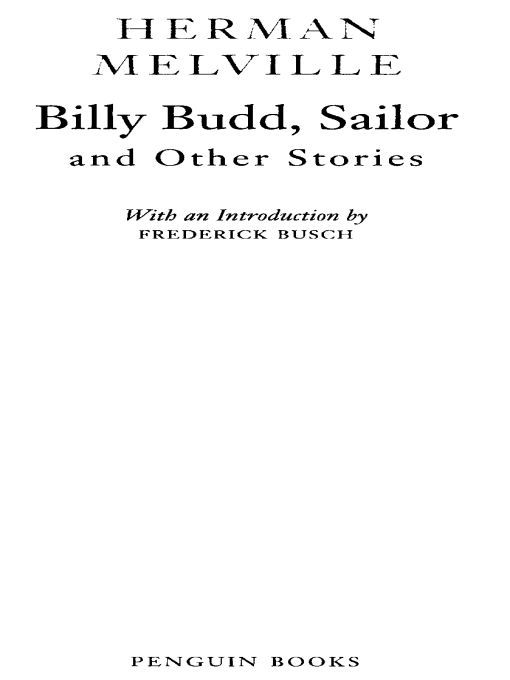
 CLASSICS
CLASSICS